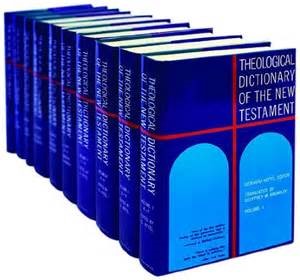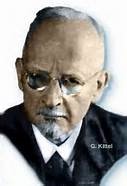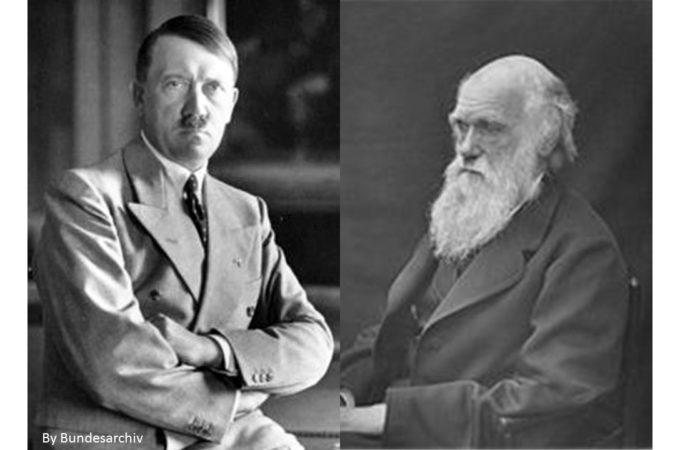As we wrote in part 1, a prominent New Testament scholar joined the Nazi cause. And he did so while he was still developing his renowned work, the Theological Dictionary of the New Testament.
 Kittel’s TDNT is used as a premier reference work in training schools and by serious pastors, theologians and Bible commentators. Here are some samples of praise for Kittel:
Kittel’s TDNT is used as a premier reference work in training schools and by serious pastors, theologians and Bible commentators. Here are some samples of praise for Kittel:
- The editors of the 1963/64 English translation wrote: “not only a reference work or a starting-point for further research, but as a formative contribution to theology.” Geoffrey W. Bromley, the English translator of Kittel, wrote in the Preface: “the ultimate worth [of Kittel] lies in its fundamental orientation and its objective findings.”
- Wm B. Eerdmans, the distinguished evangelical publishing house that produced TDNT, wrote that Kittel is “considered by many scholars to be the best New Testament Dictionary ever compiled.”
- Christianbooks.com wrote in their Production Description that Kittel “is one of the twentieth century’s most monumental achievements in biblical studies. … More than 100 distinguished scholars contributed to the work, including specialists in the Old Testament, Septuagint, Hellenistic, Semitic and Rabbinic studies.”
- Logos.com, one of the leading electronic Bible study resources, writes of Kittel, “One of the most widely-used and well-respected theological dictionaries ever created. TDNT is indispensable for studies in the Greek New Testament.”
All these commendations, but no warning that the man responsible, whose name the series bears, was a Nazi! How can this be?
How could a Nazi develop a theological dictionary?
This information has shocked me, and the friends I have shared this with. How does Kittel’s Nazi ideology affect his scholarly work? It poses a dilemma for those who take the Word of God seriously in our lives and teaching.
The famous composer Richard Wagner was a brilliant contemporary of Kittle. Wagner supported the Nazi cause with his musical genius, as Kittel did with his theological acumen. Does Wagner’s ideology corrupt his music? Should people shun his music because of his political convictions? (I know people who do.) Wagner scholar Bryan Magee has written:
I sometimes think there are two Wagners in our culture, almost unrecognizably different from one another: the Wagner possessed by those who know his work, and the Wagner imagined by those who know him only by name and reputation.[2]
Could this be the case with Gerhard Kittel as well?
Who was Gerhard Kittle?
Kittel’s Background
 Gerhard Kittel was born 1888 in Breslau, Germany and died in Tubingen in 1948. Kittel’s father, Rudolf Kittel, was an Old Testament scholar.
Gerhard Kittel was born 1888 in Breslau, Germany and died in Tubingen in 1948. Kittel’s father, Rudolf Kittel, was an Old Testament scholar.
Kittel’s expertise was Judaism during New Testament times. In his early years he seemed sympathetic to the Jewish people. Speaking of Kittel, artist and Messianic Christian Daniel Botkin said, “He praised the Jewish people and the Talmud and emphasized the Jewish roots of Christianity.”
Kittel was educated at the very academic and Enlightenment-oriented Tubingen University where he later became a professor of the New Testament.
Perhaps he is most well-known for his work on the TDNT, which has earned the moniker, “Kittel.” The conceptual work and planning for this monumental undertaking began in 1928. The concept was to explore word meanings in their historic and cultural backgrounds for all the major words in the New Testament. The actual work on the TDNT began four years later.
Typically, theologians and linguists have an enormous compulsion for accuracy and detail. According to Dr. David Thomason, those working with Kittel were no exception. Thomason characterized them as “maniacal in their pursuit of ‘original source material.’” Their work was recognized as both scholarly and comprehensive.
In the mid-19th century the West made a titanic shift from Judeo-Christian Theism to modernism. This brought acceptance of the naturalistic Darwinian paradigm. Everything in the universities shifted. Darwin’s evolutionary “theory” was not simply a biological framework; it became an atheistic ideology to redefine all areas of life. We now have evolutionary biology, evolutionary history, evolutionary psychology, evolutionary law, and evolutionary sociology.
During the time of the reigning Judeo-Christian paradigm, theology was considered “Queen of the sciences.” It gave meaning to all of life and a final integration point for all academic life. Now, in the modern world, evolutionism became the integration point. Theology was now subservient to naturalism. Add evolutionary theology to the list above.
Evolutionary sociology is known as social Darwinism. The mantra is “survival of the fittest.” Hitler’s murder of the Jews and other “unfit” people established a direct-line application of Darwinian ideology – social Darwinism to the death camps.
 The same social Darwinism led to the eugenics movement in the United States, to Margaret Sanger and Planned Parenthood. The same
The same social Darwinism led to the eugenics movement in the United States, to Margaret Sanger and Planned Parenthood. The same evolutionary ideology that gave us the German death camps a generation ago has given us abortion factories today, where millions of unborn babies have been exterminated. That’s another direct line: from Social Darwinism to the murder of innocent human beings.
evolutionary ideology that gave us the German death camps a generation ago has given us abortion factories today, where millions of unborn babies have been exterminated. That’s another direct line: from Social Darwinism to the murder of innocent human beings.
And evolutionary theology justified the holocaust in Germany. See the trailer to Phil Robertson’s film, Torchbearers, to get a sense of where civilizations end up when they deny God.
Ideas have consequences!
- Darrow Miller
For Reflection:
- How could the editor of the “gold standard” of New Testament theological dictionaries have been a Nazi?
- How is it possible that such influential Christian scholars and publishers did not give acknowledgement or warning of Kittel’s Nazi ties?
- How have you observed evolutionism impacting your nation, area of study and your work?






